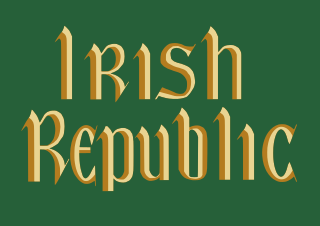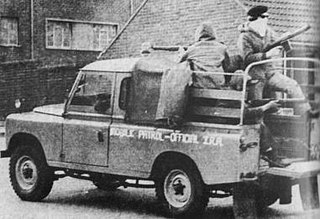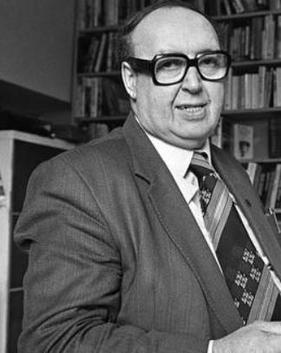
Sinn Féin is an Irish republican and democratic socialist political party active throughout both the Republic of Ireland and Northern Ireland.

The Official Irish Republican Army or Official IRA was an Irish republican paramilitary group whose goal was to remove Northern Ireland from the United Kingdom and create a "workers' republic" encompassing all of Ireland. It emerged in December 1969, shortly after the beginning of the Troubles, when the Irish Republican Army (IRA) split into two factions. The other was the Provisional IRA. Each continued to call itself simply "the IRA" and rejected the other's legitimacy.
The Workers' Party is a Marxist–Leninist political party active in both the Republic of Ireland and Northern Ireland.

The Irish Republican Socialist Party or IRSP is a Marxist-Leninist and republican party in Ireland. It is often referred to as the "political wing" of the Irish National Liberation Army (INLA) paramilitary group. It was founded in 1974, during the Troubles, by former members of the Workers' Party, but claims the legacy of the Irish Socialist Republican Party of 1896–1904.

Joe Cahill was a prominent figure in the Irish republican movement in Northern Ireland and former chief of staff of the Provisional Irish Republican Army (IRA). He joined a junior-republican movement, Na Fianna Eireann, in 1937 and the following year, joined the Irish Republican Army. In 1969, Cahill was a key figure in the founding of the Provisional Irish Republican Army. During his time in the Provisional IRA, Cahill helped import weapons and raise financial support. He served as the chief of staff in 1972, but was arrested the following year when a ship importing weapons was intercepted.

Robert Jonathan Bradford was a Methodist Minister and a Vanguard Unionist and Ulster Unionist Member of Parliament for the Belfast South constituency in Northern Ireland until his assassination by the Provisional Irish Republican Army (IRA) on 14 November 1981.

Patrick Joseph "Paddy" Devlin was an Irish socialist, labour and civil rights activist and writer. He was a founding member of the Social Democratic and Labour Party (SDLP), a former Stormont MP, and a member of the 1974 Power Sharing Executive.

Dáithí Ó Conaill was an Irish republican, a member of the IRA Army Council of the Provisional IRA, and vice-president of Sinn Féin and Republican Sinn Féin. He was also the first chief of staff of the Continuity IRA, from its founding in 1986 until his death in 1991. He is credited with introducing the car bomb to Northern Ireland.

Milltown Cemetery is a large cemetery in west Belfast, Northern Ireland. It lies within the townland of Ballymurphy, between Falls Road and the M1 motorway.
Sinn Féin is the name of an Irish political party founded in 1905 by Arthur Griffith. It subsequently became a focus for various forms of Irish nationalism, especially Irish republicanism. After the Easter Rising in 1916, it grew in membership, with a reorganisation at its Ard Fheis in 1917. Its split in 1922 in response to the Anglo-Irish Treaty which led to the Irish Civil War and saw the origins of Fianna Fáil and Fine Gael, the two parties which have since dominated Irish politics. Another split in the remaining Sinn Féin organisation in the early years of the Troubles in 1970 led to the Sinn Féin of today, which is a republican, left-wing nationalist and secular party.

Joe McCann was an Irish republican paramilitary. A member of the Irish Republican Army and later the Official Irish Republican Army, he was active in politics from the early 1960s and participated in the early years of the Troubles in Northern Ireland. He was shot dead during a confrontation with RUC Special Branch members and British paratroopers in 1972.
William "Billy" McMillen, aka Liam McMillen, was an Irish republican activist and an officer of the Official Irish Republican Army (OIRA) from Belfast, Northern Ireland. He was killed in 1975, in a feud with the Irish National Liberation Army (INLA).

The Falls Curfew, also called the Battle of the Falls, was a British Army operation during 3–5 July 1970 in the Falls district of Belfast, Northern Ireland. The operation began as a search for weapons in the staunchly Irish nationalist district. As the search ended, local youths attacked the British soldiers with stones and petrol bombs and the soldiers responded with CS gas. This quickly developed into gun battles between British soldiers and the Irish Republican Army (IRA). After four hours of continuous clashes, the British commander sealed off the area, which comprised 3,000 homes, and imposed a curfew which would last for 36 hours. Thousands of British troops moved into the curfew zone and carried out house-to-house searches for weapons, while coming under intermittent attack from the IRA and rioters. The searches caused much destruction, and a large amount of CS gas was fired into the area. Many residents complained of suffering abuse at the hands of the soldiers. On 5 July, the curfew was brought to an end when thousands of women and children from Andersonstown marched into the curfew zone with food and other supplies for the locals.

Brendan Hughes, also known as "The Dark", and "Darkie" was a leading Irish republican and former Officer Commanding (OC) of the Belfast Brigade of the Provisional Irish Republican Army (IRA). He was the leader of the 1980 Irish hunger strike.

The Belfast Brigade of the Provisional IRA was the largest of the organisation's brigades, based in the city of Belfast, Northern Ireland.

Des O'Hagan was a prominent member of the Workers' Party and was a founding member of the Northern Ireland Civil Rights Association.
Seamus Lynch is a former Irish republican and socialist politician.

The Springfield Road is a residential area and road traffic thoroughfare adjacent to the Falls Road in west Belfast. The local population is predominantly Irish nationalist and republican. Parts of the road form an interface area with the neighbouring Ulster loyalist areas of the Greater Shankill and it was the site of much activity during the Troubles. The Springfield Road includes the Ballymurphy and New Barnsley districts and is overlooked by Black Mountain and Divis.
The Official IRA's Belfast Brigade was founded in December 1969 after the Official IRA itself emerged in December 1969, shortly after the beginning of the Troubles, when the Irish Republican Army split into two factions. The other was the Provisional IRA. The "Officials" were Marxist-Leninists and worked to form a united front with other Irish communist groups, named the Irish National Liberation Front (NLF). The Brigade like the pre-split IRA brigade before the split had three battalions, one in West Belfast, one in North Belfast and the third in East Belfast. The Belfast Brigade was involved in most of the biggest early confrontations of the conflict like the Falls Curfew in 1970, the battles that followed after the introduction of Internment without trial in 1971 and Volunteers joined forces with the Provisional brigade to fight the British Army and UVF during the Battle at Springmartin in 1972. The first Commanding Officer (CO) of the brigade was veteran Billy McMillen who fought during the IRA Border Campaign. Shortly after the death of Official IRA Belfast "Staff Captain" Joe McCann in April 1972, the battalion structure of the brigade was done away with and command centralized under McMillen.
This is a timeline of actions by the Official Irish Republican Army, an Irish republican & Marxist-Leninist paramilitary group. Most of these actions took place as part of a Guerrilla campaign against the British Army & Royal Ulster Constabulary and internal Irish Republican feuds with the Provisional IRA & Irish National Liberation Army from the early 1970s - to the mid-1970s during the most violent phase of "the Troubles" in Northern Ireland.













